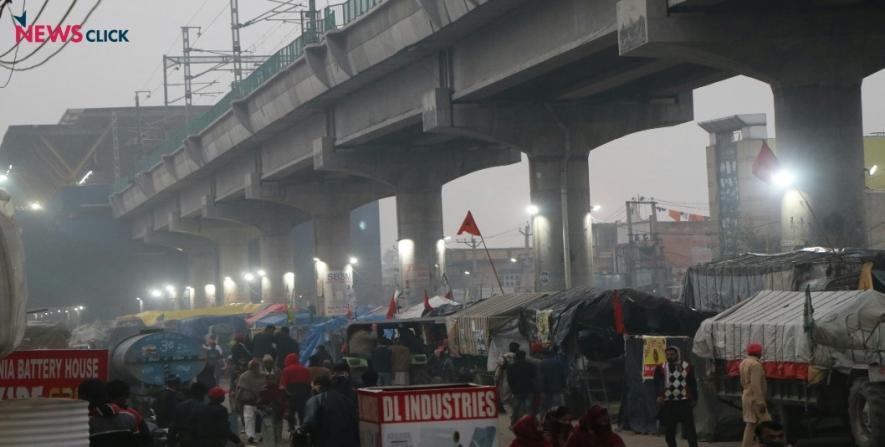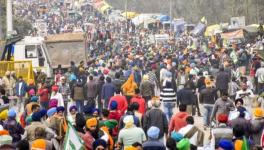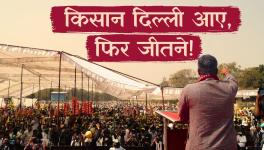Govt Not Providing Basic Amenities at Farmers’ Protest Sites, All Work Done by Volunteers, Report JSA Delhi and Haryana

The heavy rains had made the farmers’ protest site at the Delhi border muddy with water getting stagnated and flies making home in the garbage collected at the roadside. Nearby, a makeshift kitchen was being prepared to cook langar (meals) for the people. As one broods over the required cleanliness, suddenly a truck can be spotted not far from the area, brought in by a group of young people from Punjab Youth Force (Samrala). The truck is equipped with state-of-the-art technology – a road sweeper-cum-suction machine to collect garbage and the stagnating water, making the area dry and clean in a matter of minutes.
This was a usual day at the Singhu border. Although the protesting farmers have been going through difficult times at the borders, such small efforts from numerous volunteers and organisations are setting examples of solidarity and camaraderie in support of the ongoing movement demanding repeal of the three farm laws.
As the farmers’ protest entered its 47th day on January 11, Jan Swasthya Abhiyan released a Report with findings regarding the status of basic amenities at the protest sites. The report highlights that issues such as lack of proper sanitation, insufficient lighting, mismanagement of solid waste disposal, water stagnation, and shortage of warm clothes have emerged as primary concerns of the protestors who are sitting-in at the Delhi borders.
These are the findings from the rapid assessment conducted by the Delhi and Haryana chapters of Jan Swasthya Abhiyan (JSA). JSA is a national-level movement on health and healthcare across the country consisting 21 national networks and more than 150 organisations and state-level JSA platforms. The rapid assessment, conducted over December 19-22, 2020, at the five protest sites, namely Singhu, Tikri, Shahjahanpur, Ghazipur and Palwal covered 201 respondents.
Team JSA observes that there is a complete abdication of responsibility by the state in making provisions for basic amenities for the people. The farmers’ struggle is being sustained by voluntary support of a large number of individuals and organisations. The report urges the central government, various state governments, local bodies and other concerned authorities to step in and discharge their responsibility in ensuring basic amenities to the people.
Sanitation Facilities
The report highlights that the sanitation facilities are in shambles at the protest sites at five border points of Delhi and the people are being forced to defecate in open with almost three in every five respondents relying on open sites for defecation. Although some mobile toilets have been provided by the Delhi government, these are two few in number and are not being cleaned and maintained properly by the local authorities. Nearly 70% respondents shared that the mobile toilets are not cleaned regularly and thus, are not usable.
Sanitation and Menstrual Hygiene Issues faced by Women
The problems get compounded for women protestors at the borders. The report highlights that “there is no provision of lighting around the toilets making it difficult to use them after dark.” Women are facing added troubles as they do not want to defecate in the open. Women protesters are “eating less and consuming less water to avoid using toilets”. With no covered and safe place for bathing, these women let go of bathing for days, compromising their hygiene.
Majority of the women have had to arrange for sanitary pads themselves as these were rarely provided at the protest sites, with some availability at medical camps. Women also found it challenging to dispose of the pads. Hence, many are resorting to the use of cloth.
Availability of Water for Drinking and Otherwise
According to the survey, the majority of respondents were dependent either on packaged drinking water or water tanks arranged by the volunteers. There was hardly any facility made by any state government at any of the sites. About 70% respondents said the water for non-drinking purposes like cleaning, bathing, and washing etc. too was being arranged by volunteers and nearly 18% said that it was the locals from nearby areas who were helping. Only 5.8% respondents said that they used government water tanks.
Water Stagnation
Around 40% respondents observed that there is water stagnation around the protest sites and 57.8% said that lack of drainage facilities is the main reason for water stagnation. Water stagnation is a matter of concern, especially around the kitchens and langar locations, with visible presence of flies etc. Such a situation may lead to water-borne diseases and put the lives of the protestors at risk.
Solid Waste Disposal
Efforts from civil bodies in arranging sanitation workers for garbage collection has been minimal at most of the sites. According to the survey respondents, either it is the volunteers making efforts to collect garbage with trucks and trolleys or protestors themselves collecting garbage physically through dustbins arranged by the volunteers.
Health Issues
JSA has also been organising medical camps at three border protest sites – Singhu Tikri and Shahjahanpur. Many doctors, nursing students and other paramedics are providing voluntary services at these camps. The JSA report highlights that as there is a large proportion of people in the middle to old age category, most health related complaints are of non-communicable diseases (NCDs). It is noteworthy that in about 14,000 patients who have visited the JSA medical camps till date, no covid-related symptoms have been observed.
JSA report observes that there is urgent need of doctors and paramedics catering to the needs of patients with special focus on providing care to the geriatric age group. With Delhi still under the grip of the cold season, the health problems might get compounded and adequate provisioning of healthcare workers and ambulances needs to be ensured.
The JSA report also observes increasing instances of depression and anxiety, which are also a reflection of the uncertainties the farmer community and the rural population at large is facing due to the problematic farming policies in the country, and the three new farm acts enacted by the central government.
Standing in solidarity with the demands of the farmers to repeal the three farm laws, JSA Delhi and Haryana have put the following demands regarding the basic amenities for the people –
-
Provision of proper sanitation facilities in the form of adequate number of mobile toilets and arrangements for regular cleaning of these toilets
-
Arrangements for clean drinking water
-
Arrangements for regular solid waste collection and disposal from all the protest sites
-
Ensuring that nearby public health facilities (PHCs, CHCs, DH) are geared to provide
medical facilities and medicines to the people in need at these sites, which are linked with outreach activities at all protest sites, with sufficient number of doctors and health professionals, proper referral arrangements and adequate ambulance services. Special focus on NCDs and geriatric care.
-
Deploying active mental health care and counselling teams in all protest sites and actively motivate people to seek support from these facilities whenever needed.
-
Setting up tents at various sites to improve protection from climate related health issues.
-
Regular efforts to contain mosquitoes and flies.
In the latest developments as on January 12, expressing disappointment over the way the central government has been handling the farmers’ protest, the Supreme Court of India has stayed the implementation of the three farm laws until further orders. It has also formed a committee of agricultural experts to take over negotiations with farmers to end the crisis. However, as the protest continues, what is urgently required is that the respective state governments at the Delhi borders and other local authorities move into action and discharge their duty of providing basic amenities to the people.
(The author was part of the JSA survey and report writing team)
Get the latest reports & analysis with people's perspective on Protests, movements & deep analytical videos, discussions of the current affairs in your Telegram app. Subscribe to NewsClick's Telegram channel & get Real-Time updates on stories, as they get published on our website.
























